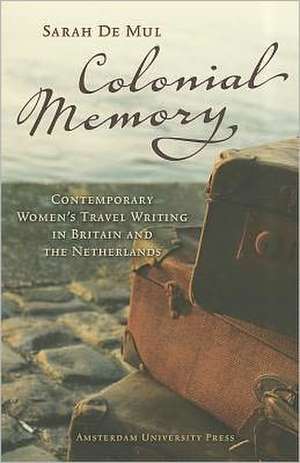Colonial Memory: Contemporary Women’s Travel Writing in Britain and The Netherlands
Autor Sarah De Mulen Limba Engleză Paperback – 14 noi 2011
“A vividly conceived and theoretically astute reading of the complicated weavings between the past and present involved in memory work and the process of nostalgic return.”—Elleke Boehmer, University of Oxford
Preț: 217.93 lei
Nou
Puncte Express: 327
Preț estimativ în valută:
41.70€ • 43.29$ • 34.78£
41.70€ • 43.29$ • 34.78£
Carte disponibilă
Livrare economică 03-17 martie
Livrare express 14-20 februarie pentru 21.32 lei
Preluare comenzi: 021 569.72.76
Specificații
ISBN-13: 9789089642936
ISBN-10: 9089642935
Pagini: 180
Dimensiuni: 216 x 235 x 13 mm
Greutate: 0.3 kg
Editura: Amsterdam University Press
Colecția Amsterdam University Press
ISBN-10: 9089642935
Pagini: 180
Dimensiuni: 216 x 235 x 13 mm
Greutate: 0.3 kg
Editura: Amsterdam University Press
Colecția Amsterdam University Press
Notă biografică
Sarah De Mul is a postdoctoral fellow of the Research Foundation Flanders in the Department of Literary Studies at Leuven University.
Cuprins
Acknowledgements
Introduction: ‘Yesterday does not go by’
Chapter 1: A trip down memory lane. Colonial memory in women’s travel writing
Chapter 2: Women’s memory of Rhodesia, the Dutch East Indies and Dutch and British cultures of colonial remembrance
Chapter 3: Nostalgic memory in Aya Zikken’s Terug naar de atlasvlinder
Chapter 4: Indo postmemory in Marion Bloem’s Muggen Mensen Olifanten
Chapter 5: Everyday memory in Doris Lessing’s African laughter. Four visits to Zimbabwe
Conclusion
Notes
Bibliography
Index
Introduction: ‘Yesterday does not go by’
Chapter 1: A trip down memory lane. Colonial memory in women’s travel writing
Chapter 2: Women’s memory of Rhodesia, the Dutch East Indies and Dutch and British cultures of colonial remembrance
Chapter 3: Nostalgic memory in Aya Zikken’s Terug naar de atlasvlinder
Chapter 4: Indo postmemory in Marion Bloem’s Muggen Mensen Olifanten
Chapter 5: Everyday memory in Doris Lessing’s African laughter. Four visits to Zimbabwe
Conclusion
Notes
Bibliography
Index








